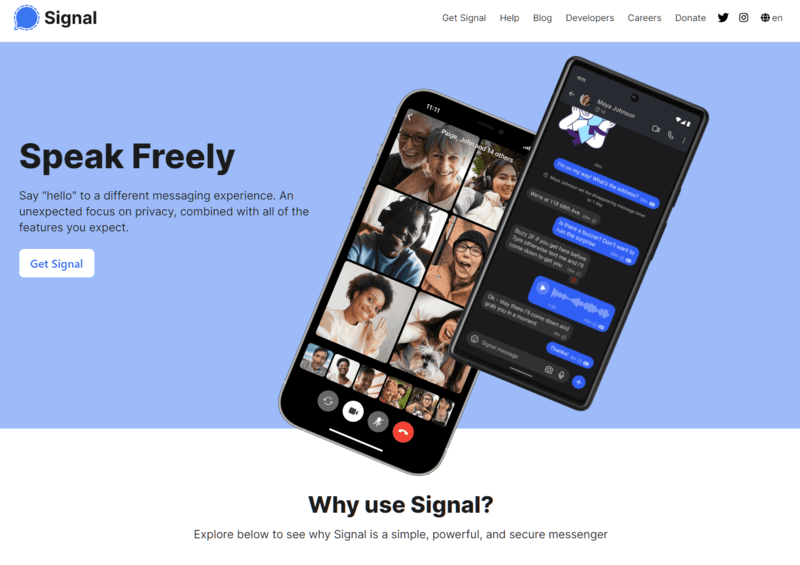Signal App Scams: Protecting Yourself from Scammers on the Privacy-Focused Messaging App

Scams are part of the Internet. Scams have become part of many messaging services as a result.
Signal, a more privacy-focused app that millions of people use globally, is not an exception, and scammers are regularly working on ways to get people to part from their information and money on the platform.
So what do you need to know, and what do you need to do? I’ll guide you through the scams, the defenses, and how it all works:
What Is Signal App Used For?
Signal App is a messaging, voice call, and video messaging app developed and operated by the Signal Foundation. This non-profit group seeks to make private communication accessible to all.
While it does focus on privacy, one does require a phone number to sign up for it. Note that while there is a prompt for your name and a photo, these are optional, and anything can be used.
Given the growing concerns about online privacy and the data messenger apps collect, people want an app they can trust to keep their data and messages private. Signal is that app for many, alongside a few others.
However, if you’re reading this, you probably know what Signal is and use it, and you might have noticed that there are scammers on the platform. This is the downside to its setup: it’s hard to know who’s on the other end.
Is Signal App Safe?
Ok, everyone says Signal is safer, but why? What makes it so special?
There are a few reasons why:
- There is end-to-end message encryption. This means only the sender and the recipient can read the message. Even Signal can’t “listen” in on conversations.
- The app is open source. If there’s a potential security issue with the app or something fishy going on, anyone can theoretically spot it.
- Signal does not collect data and cannot provide it to anyone. Even if governments ask for data, there is no data to give. Data is stored locally on the user’s devices.
- All claims of privacy and security Signal makes are verified by outside parties. It walks its (very private) talk.
Notice that everything I mention has little to do with scams, verifying people’s identities, and things great for legitimate business. Signal has a purpose, and stopping scammers isn’t it.
Why Does It Bring Safer Not Matter to Scammers?
Signal is protected from forceful attacks and snooping, but not attacks related to social engineering.
Think of a house or rather a bunker. The house is made of solid reinforced concrete, has locks made of titanium, and even has a few (still adorable) guard dogs ready to defend the home at a moment’s notice. No criminal would think of trying to forcefully break in if they could feasibly even do so.
All that security means little if the bunker owner lets the criminal in the front door, offers to hang his coat, and lets the criminal help themselves to freshly baked macarons right from the oven.
In this scenario, the bunker is your Signal account, you’re the owner, and your personal data is the macarons.
The scammer’s goal is to take information by tricking you, not through superior hacking or snooping.
Who Performs Signal Scams?
The scammers who “work” on Signal scams are mostly the same people who will run scams relating to texting or through other messaging services. While the apps might differ, the scams remain mostly the same, albeit perhaps with a few different bells and whistles.
By understanding this, you’ll have a leg up. It’s also helpful to understand the following:
The Most Common Signal App Scams
We can’t list every type of Signal scam, as we’d have to list most online scams, and there are a lot. However, we can talk about the most common categories of scams.
Knowing how to recognize and defend yourself against these scams will make you much better prepared than most users.
1. Fake Employment Scams
Interestingly, the type of scam most associated with Signal in one form or another is a fake or suspicious employment scam.
This can go one of a few ways:
- You might get an unsolicited message on Signal informing you of a job opportunity. They might have done some basic research and made a more targeted message for you based on public information.
- You might be looking for jobs on another site or social media, and you find something up your alley. You might be told to go to a link or contact someone if interested, but that person is on Signal.
- This is much more common with freelance gigs and related sites than on general employment sites, which are often more vetted.
Regardless, negotiating job terms on Signal is not recommended and is nearly always a scam.
Defense: Signal should have no place in your career or job hunt, ever.
✎ Related: How to Avoid Work-From-Home Job Scams ➔
2. Fake Tech Support or Customer Support Scams
Tech support scams, etc., are less common on Signal than on other platforms, as you will rarely get company or customer support messages on Signal, but it still happens often enough to mention here.
What will happen is that the scammer will attempt to get victims to provide account or personal information under the pretense of their own protection.
It could be a “verification request” message or a report saying that your Signal account or phone is at risk. It might be a service offer. And it could even be the offer of a refund, though again, such interactions would be rare on Signal.
Whatever the case, don’t expect any company to reach out to you on Signal like that. There are better channels for it.
Defense: If someone claiming to be customer service contacts you on Signal, just ignore them and block and delete the message. Contact the company through official channels or engage with a legitimate service if you think service is required.
✎ Related: How to Avoid Work-From-Home Job Scams ➔
3. Romance Scams
The romance scam isn’t a new idea; scammers have been using it in one form or another since the dawn of civilization.
With a romance scam, the scammer will pretend to be someone romantically interested or potentially romantically interested in the potential victim.
It might be someone pretending to be a lost connection vague enough for you to believe or someone from another country hoping to find love in a new and exotic place.
Whatever the case, don’t believe them. They aren’t even close to who they say they are and want money for a plane ticket that will never come.
Romance scams are incredibly common, and there is no shortage of ways scammers can try to exploit a target. While the first message is spam, later messages after a response are often personalized, worth the scammer’s time (until AI gets better).
Defense: Don’t use an app for dating unless it’s designed for dating; even then, you should be cautious about those apps. Block the likely scammer.
✎ Related: 6 Warning Signs of A Military Romance Scam ➔
4. Prize, Free Gift Card, or Sweepstakes Scams
Have you won any prizes lately in contests you didn’t even enter? No? I thought as much. Yet scammers will often send fake prize messages to intended victims regardless.
In this scam, to collect a prize you just won, you either need to click a link (leads to malware or a personal information collection site), respond with personal or financial information, or pay a small fee and give bank details.
Defense: You didn’t win anything. Prizes aren’t going to be given out on Signal. Delete the message and block the sender.
✎ Related Articles:
5. Random Acquaintance or Wrong Number Scams
You’re on your phone doing your evening, procrastinating, that thing you should be doing when you suddenly get a message on Signal. It is someone claiming to have met you a while back and hoping to reconnect.
No, they don’t have your name exactly right, or have your name, and they don’t have all the details right, but it’s fine. That festival was pretty crazy, anyway. They’re probably chill, right?
Wrong, they’re probably a scammer hoping to gain your trust to abuse later.
This isn’t exactly like a romance scam, but it’s close.
Another variant is someone claiming to have the wrong address or number but then getting to know you after the initial “chance” encounter. It otherwise plays by the same steps.
Defense: If you get a random message, just don’t respond to it. There are better ways to meet and connect with people.
How to Better Protect Yourself on Signal?
What can you do to protect yourself in general and keep away from scammers? Start with the following:
- Ensure you only talk to people you know on Signal and can confirm their identity outside the app if needed. There are people who need to communicate only on the app, but if you’re one of them, you probably won’t be reading this.
- Never click suspicious links, even if it’s from someone you think you know.
- If something sounds too good to be true, it is.
- Never give out personal, financial, or security information on Signal. Just don’t. I promise you; you don’t ever need to.
- Learn as much as possible about the popular scams on the platform.
- Note that most scams we’ve discussed are variations of popular text message scams. If a scam becomes popular on SMS, then if it makes sense for it to transfer over, it will.
- Note that most scams we’ve discussed are variations of popular text message scams. If a scam becomes popular on SMS, then if it makes sense for it to transfer over, it will.
- Know the settings, features, and options on Signal for blocking users or simply fine-tuning your privacy.
What Do To If You’ve Fallen Victim to a Signal App Scam?
1. Understand the Situation
First off, don’t panic. Panicking should be scheduled promptly after the situation has been resolved in a nice 15-minute slot on your calendar (or not at all).
Understand what scam you fell for, what goods or information you gave or might have given to the scammer, and what accounts have been compromised.
Once you have your answers, resolve to move on to the next steps.
2. Cut Off Contact with the Scammer
I promise you that you will gain nothing but a headache a misery if you keep trying to contact the scammer or keep up communications with them in an unwise attempt to get your stuff back directly (if that’s even possible). You don’t know where they are, and you won’t be able to take action yourself.
Block the scammer, and uninstall Signal or temporarily turn on airplane mode. This will give you time to figure out what to do next and contact who you need to contact.
3. Report the Scam to the Proper Channels
If any of your accounts have been compromised, you should contact support to get them back or lock them down temporarily. What to do and who to contact will vary from account to account.
Otherwise, the following should be a priority:
4. Scan for and Remove Malware
If part of the scam was clicking on a suspicious link or downloading a file, there is a strong chance you have some form of malware on your device.
That malware is the scammer’s meal ticket, and you’re about to give them a refund. Install a malware protection service or app on your device(s) as soon as you can, and then do a scan. Some good options for software include Norton, McAfee, and AVG.
5. Check Your Signal and Other Accounts
If you give away information about your Signal account, you will want to ensure it is safe. It is less likely to be compromised than other accounts (there is less reason to hack it, with data being stored locally), but being careful doesn’t hurt.
If other accounts or financial information was compromised, this is the time to check on that, changing passwords and accessing information as needed. If you gave away your security or password information to scammers, change it immediately.
6. Invest in Identity Theft Protection
Depending on the nature of the scam or the information/access you gave out, identity theft is one of your biggest concerns.
It takes less information than you think to happen. Additionally, it can happen nearly immediately or months to years after the event. If you don’t notice anything in a few weeks, that doesn’t mean you are safe.
To help make sure that you are indeed safe, you will want to keep an eye out for suspicious transactions, credit checks, etc.
But this can be quite the task, so I recommend checking out a service like Aura that provides strong identity theft protection services and features. They’ll monitor your accounts and credit so you don’t have to, and you’ll get defense, insurance, and alerts when needed. It’s worth the investment, especially if you have recently been the victim of a scam.
7. Prepare for the Future
Take some time now to review what you know and don’t know about common scams so you can better protect yourself in the future. While the scammer might have gotten the upper hand this time, you can turn this experience into knowledge and ensure nothing like it ever happens again, on Signal or off.
Reflection will be the gateway to future safety.
Conclusion – Take Measures to Keep Yourself Safer on Signal
Signal can be an incredibly useful app and necessary in some places, but you still need to protect yourself.
While it is a safer app where hacking, data privacy, and information security are concerned, that doesn’t mean much in the context of scammers. You need to know when to shut the door and cut off communications.
I hope you’ve learned enough from this piece to better protect yourself on Signal and keep scammers out of your life. And if not, I hope you will continue searching for information on defending yourself and what you can do.
Before you finish, though, you can do a few things today. Invest in Aura and identity theft defense. Make sure malware is off of your device. Memorize what to do in case you get scammed on Signal. Your future self will thank you for taking these steps.
✎ Read the various scams that have been reported on other platforms:



